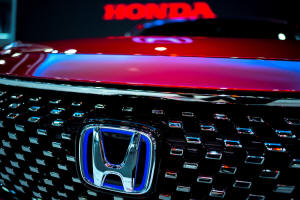|
Many big Japanese companies have built extensive production hubs
in China but have recently seen output snarled by
COVID-19-related lockdowns. There are also deepening worries
about the impact of tensions between the United States and
China.
Nearly 40% of Honda's automobile production took place in China
in the last financial year.
Honda would continue to keep its supply chain in China for the
domestic market in the world's second-largest economy, while
building a separate one for markets outside of China, the Sankei
said. It did not say where it got the information.
A Honda spokesperson said the Sankei report is not something
announced by the company, adding it has been working on
reviewing and risk-hedging its supply chain in general.
"The review of the supply chain from China and risk hedging are
elements that need to be considered, but it is not quite the
same as the objective of decoupling," the spokesperson said.
The government had previously offered companies incentives to
bring production back to Japan, although uptake appeared to be
subdued, with some executives and analysts saying it would be
difficult for Japan Inc to suddenly move away from a market
where it had steadily built production and logistics hubs.
Nevertheless, some of companies have already sought to reduce
dependence on China following strict COVID-19 lockdowns in
Shanghai.
Another Japanese automaker Mazda Motor Corp said this month it
would ask its parts suppliers to increase stockpiles in Japan
and produce components outside China, after the lockdowns
destabilised supply, forcing it to shut down domestic production
for 11 days in April and May.
Mazda said it would seek to include higher domestic inventories
and diversification of production outside China when forming
contracts with suppliers for designing new models in the long
term.
(Reporting by Satoshi Sugiyama and David Dolan; editing by Jason
Neely and Tomasz Janowski)
[© 2022 Thomson Reuters. All rights
reserved.]
This material may not be published,
broadcast, rewritten or redistributed.
Thompson Reuters is solely responsible for this content.

|
|





